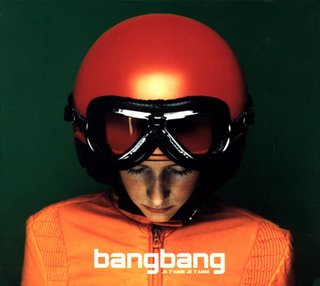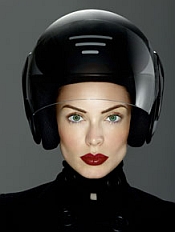Colonia, "Do Kraja (Pop Remix)"/"Polgedom Me Skini" (2006)
It's a big world out there, and I'm always happy to be reminded of it (I'm also happy to be reminded that it's a small world, but just go with it, okay?) -- like when I learn, for the first time, about a band who turns out to have been huge for decades, though only in certain places on the globe. It makes me feel like we live in parallel universes (creepy music), and that there might be wonderful pockets where scorn meets the every move of, say, Fergie (creepy music of a different sort).
So, when I helped review the Croatian Top 10 singles for Enthusiastic But Mediocre a month ago, and heard Colonia's fantastic "Do Kraja," it was nice to find out that they've been Croatia's top dance act for eons. Indeed, the album, which is also titled Do Kraja, is the group's eighth, and I gave it a spin on the strength of its title track (the mp3's still available at EBM) -- which I had described as "the consequence of someone nicking the bassline from 'Can't Get You Out Of My Head,' tweaking it, and then thinking, 'Well, this would be even greater if we added whistling'" -- and Edward's description, elsewhere, of the two men behind the group (Boris Djurdjevic and Tomislav Jelić) as Croatia's Xenomania.
Well, they're not, really. Do Kraja is nowhere as great as "Do Kraja." Except for when an Ace Of Base pastiche interrupts the proceedings, too many tracks err on the side of cheesy bosh bosh eurodance, like Infernal at their worst "Hava Nagila"-covering moments. But at least the album starts and ends strongly: with "Do Kraja," and then a surprisingly good remix of the song. "Surprising," because this "pop remix" audaciously takes out one of the original's most distinctive features: the whistling. But it's quite a canny decision: although the whistling made the original version completely irresistible, it was also the element that was the most derivative, since (as several panelists noted) it obviously channeled Bob Sinclar. The remix substitutes instead an acoustic guitar that turns the track into a kind of Balearic number, and the "ah-ah-ah"s reinforce that impression. The only other track that stands out is the second, "Polgedom Me Skini." (Rough translation: "my skin is a pappadum.") This has a similarly boshy bassline, but there is a rather endearing saxophone that weaves in and out, which makes the whole thing a bit like "Baker Street" gone Euro. (But, no, despite what that might suggest, it's nothing like an Undercover song. Ew.)
It's a big world out there, and I'm always happy to be reminded of it (I'm also happy to be reminded that it's a small world, but just go with it, okay?) -- like when I learn, for the first time, about a band who turns out to have been huge for decades, though only in certain places on the globe. It makes me feel like we live in parallel universes (creepy music), and that there might be wonderful pockets where scorn meets the every move of, say, Fergie (creepy music of a different sort).
So, when I helped review the Croatian Top 10 singles for Enthusiastic But Mediocre a month ago, and heard Colonia's fantastic "Do Kraja," it was nice to find out that they've been Croatia's top dance act for eons. Indeed, the album, which is also titled Do Kraja, is the group's eighth, and I gave it a spin on the strength of its title track (the mp3's still available at EBM) -- which I had described as "the consequence of someone nicking the bassline from 'Can't Get You Out Of My Head,' tweaking it, and then thinking, 'Well, this would be even greater if we added whistling'" -- and Edward's description, elsewhere, of the two men behind the group (Boris Djurdjevic and Tomislav Jelić) as Croatia's Xenomania.
Well, they're not, really. Do Kraja is nowhere as great as "Do Kraja." Except for when an Ace Of Base pastiche interrupts the proceedings, too many tracks err on the side of cheesy bosh bosh eurodance, like Infernal at their worst "Hava Nagila"-covering moments. But at least the album starts and ends strongly: with "Do Kraja," and then a surprisingly good remix of the song. "Surprising," because this "pop remix" audaciously takes out one of the original's most distinctive features: the whistling. But it's quite a canny decision: although the whistling made the original version completely irresistible, it was also the element that was the most derivative, since (as several panelists noted) it obviously channeled Bob Sinclar. The remix substitutes instead an acoustic guitar that turns the track into a kind of Balearic number, and the "ah-ah-ah"s reinforce that impression. The only other track that stands out is the second, "Polgedom Me Skini." (Rough translation: "my skin is a pappadum.") This has a similarly boshy bassline, but there is a rather endearing saxophone that weaves in and out, which makes the whole thing a bit like "Baker Street" gone Euro. (But, no, despite what that might suggest, it's nothing like an Undercover song. Ew.)


